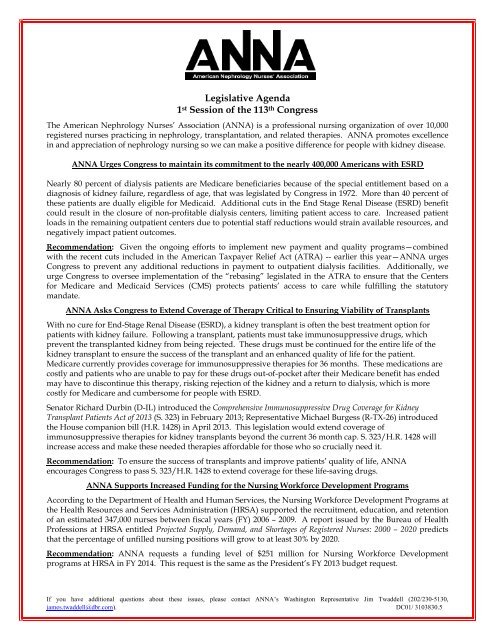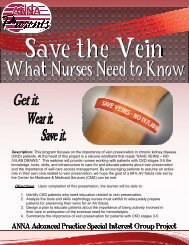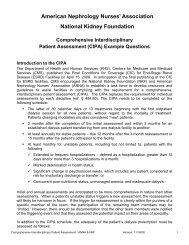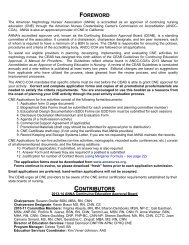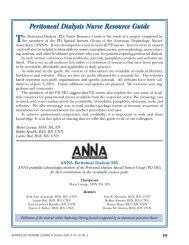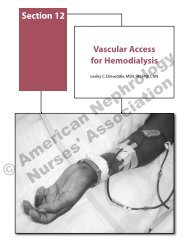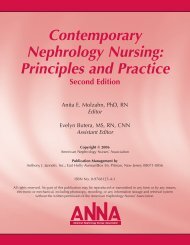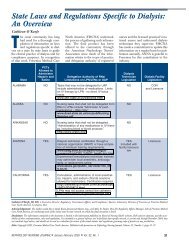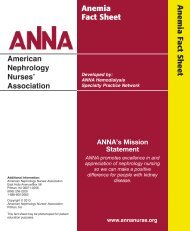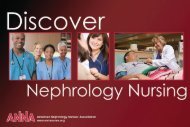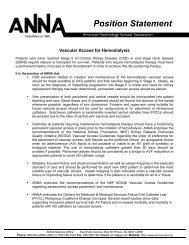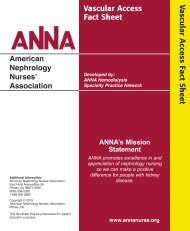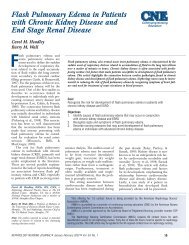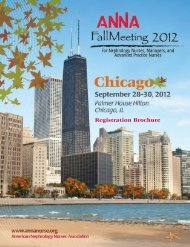Legislative Agenda - American Nephrology Nurses Association
Legislative Agenda - American Nephrology Nurses Association
Legislative Agenda - American Nephrology Nurses Association
Create successful ePaper yourself
Turn your PDF publications into a flip-book with our unique Google optimized e-Paper software.
<strong>Legislative</strong> <strong>Agenda</strong><br />
1 st Session of the 113 th Congress<br />
The <strong>American</strong> <strong>Nephrology</strong> <strong>Nurses</strong>’ <strong>Association</strong> (ANNA) is a professional nursing organization of over 10,000<br />
registered nurses practicing in nephrology, transplantation, and related therapies. ANNA promotes excellence<br />
in and appreciation of nephrology nursing so we can make a positive difference for people with kidney disease.<br />
ANNA Urges Congress to maintain its commitment to the nearly 400,000 <strong>American</strong>s with ESRD<br />
Nearly 80 percent of dialysis patients are Medicare beneficiaries because of the special entitlement based on a<br />
diagnosis of kidney failure, regardless of age, that was legislated by Congress in 1972. More than 40 percent of<br />
these patients are dually eligible for Medicaid. Additional cuts in the End Stage Renal Disease (ESRD) benefit<br />
could result in the closure of non-profitable dialysis centers, limiting patient access to care. Increased patient<br />
loads in the remaining outpatient centers due to potential staff reductions would strain available resources, and<br />
negatively impact patient outcomes.<br />
Recommendation: Given the ongoing efforts to implement new payment and quality programs—combined<br />
with the recent cuts included in the <strong>American</strong> Taxpayer Relief Act (ATRA) -- earlier this year—ANNA urges<br />
Congress to prevent any additional reductions in payment to outpatient dialysis facilities. Additionally, we<br />
urge Congress to oversee implementation of the “rebasing” legislated in the ATRA to ensure that the Centers<br />
for Medicare and Medicaid Services (CMS) protects patients’ access to care while fulfilling the statutory<br />
mandate.<br />
ANNA Asks Congress to Extend Coverage of Therapy Critical to Ensuring Viability of Transplants<br />
With no cure for End-Stage Renal Disease (ESRD), a kidney transplant is often the best treatment option for<br />
patients with kidney failure. Following a transplant, patients must take immunosuppressive drugs, which<br />
prevent the transplanted kidney from being rejected. These drugs must be continued for the entire life of the<br />
kidney transplant to ensure the success of the transplant and an enhanced quality of life for the patient.<br />
Medicare currently provides coverage for immunosuppressive therapies for 36 months. These medications are<br />
costly and patients who are unable to pay for these drugs out-of-pocket after their Medicare benefit has ended<br />
may have to discontinue this therapy, risking rejection of the kidney and a return to dialysis, which is more<br />
costly for Medicare and cumbersome for people with ESRD.<br />
Senator Richard Durbin (D-IL) introduced the Comprehensive Immunosuppressive Drug Coverage for Kidney<br />
Transplant Patients Act of 2013 (S. 323) in February 2013; Representative Michael Burgess (R-TX-26) introduced<br />
the House companion bill (H.R. 1428) in April 2013. This legislation would extend coverage of<br />
immunosuppressive therapies for kidney transplants beyond the current 36 month cap. S. 323/H.R. 1428 will<br />
increase access and make these needed therapies affordable for those who so crucially need it.<br />
Recommendation: To ensure the success of transplants and improve patients’ quality of life, ANNA<br />
encourages Congress to pass S. 323/H.R. 1428 to extend coverage for these life-saving drugs.<br />
ANNA Supports Increased Funding for the Nursing Workforce Development Programs<br />
According to the Department of Health and Human Services, the Nursing Workforce Development Programs at<br />
the Health Resources and Services Administration (HRSA) supported the recruitment, education, and retention<br />
of an estimated 347,000 nurses between fiscal years (FY) 2006 – 2009. A report issued by the Bureau of Health<br />
Professions at HRSA entitled Projected Supply, Demand, and Shortages of Registered <strong>Nurses</strong>: 2000 – 2020 predicts<br />
that the percentage of unfilled nursing positions will grow to at least 30% by 2020.<br />
Recommendation: ANNA requests a funding level of $251 million for Nursing Workforce Development<br />
programs at HRSA in FY 2014. This request is the same as the President’s FY 2013 budget request.<br />
If you have additional questions about these issues, please contact ANNA’s Washington Representative Jim Twaddell (202/230-5130,<br />
james.twaddell@dbr.com). DC01/ 3103830.5
ANNA Requests Increased Funding for Biomedical Research and Patient Safety<br />
The National Institutes of Health (NIH) is the primary Federal agency for conducting and supporting<br />
biomedical research. It is composed of 27 Institutes and Centers and has an annual budget of over $30 billion.<br />
More than 80% of the NIH's funding is awarded through competitive grants to more than 300,000 researchers at<br />
universities, medical schools, and other research institutions.<br />
The National Institute of Diabetes and Digestive and Kidney Diseases (NIDDK) at NIH is devoted to continuing<br />
research on Chronic Kidney Disease (CKD) and End-Stage Renal Disease (ESRD). ANNA strongly supports the<br />
work being done by the National Kidney Disease Education Program (NKDEP) which helps create awareness of<br />
these diseases. NIDDK works to reduce the overall mortality and morbidity from kidney disease.<br />
The mission of the National Institute of Nursing Research (NINR) is to promote and improve the health of<br />
individuals, families, communities, and populations. NINR’s research encompasses health promotion and<br />
disease prevention, quality of life, health disparities, and end of life care. NINR seeks to expand nursing science<br />
by integrating the biological and behavioral sciences, applying new technologies to address research questions,<br />
improving research methods, and developing scientists of the future.<br />
The Agency for Healthcare Research and Quality (AHRQ) is the lead Federal agency charged with improving<br />
the quality, safety, efficiency, and effectiveness of health care for all <strong>American</strong>s. AHRQ supports health services<br />
research that will improve the quality of health care and promote evidence-based decision making.<br />
Recommendation: In order for this research to continue, ANNA respectfully requests the maximum possible<br />
funding in FY 2014 for NIDDK, $150 million in funding for NINR, and the maximum possible funding for<br />
AHRQ.<br />
DC01/ 3103830.5


